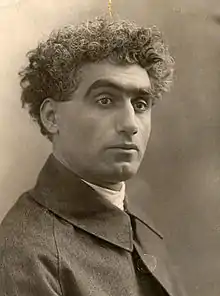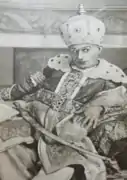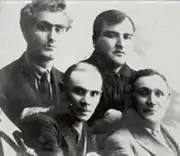Sidgi Ruhulla
Ruhulla Fatulla oghlu Axhundov (Azerbaijani: Ruhulla Fətulla oğlu Axundov, 9 April 1886 — 5 May 1959) was an Azerbaijani actor, director, People's Artist of the USSR.[1]
Sidgi Ruhulla | |
|---|---|
Azerbaijani: Sidqi Ruhulla | |
 | |
| Born | Ruhulla Akhundov April 9, 1886 |
| Died | May 5, 1959 (aged 73) |
| Resting place | Alley of Honor |
| Nationality | Azerbaijani |
| Citizenship | |
| Occupation | actor, director |
| Years active | 1906 – 1959 |
| Awards | |
Biography
Sidgi Ruhulla was born on April 9, 1886 in Buzovna. In 1904, his father, Mullah Fatulla, died, and Ruhulla sold his father's household goods and went to Moscow to study with the money he had saved. However, due to financial difficulties, Ruhulla could not complete his education and returned to Baku.[2]
After he played the role of Sidgi Bey very skilfully in N. Kamal's play "Vatan" on November 6, 1910, taked the stage-name Sidgi and he became known as Sidgi Ruhulla in the history of theater.
S. Ruhulla died on May 5, 1959 in Baku.
In 1987 (January 30) and 2006 the 100th and 120th anniversaries of the birth of People's Artist of the USSR Sidgi Ruhulla were celebrated.
Career
In the early XX century, male actors played female roles on Azerbaijani stage. This lasted until the 20s and 30s of the XX century. Ruhulla's first role was "Telli" in the comedy "He has a name, not himself" by Najaf bey Vazirov, directed by Huseyn Arablinski and staged on December 21, 1908 in Balakhani drama association. S. Ruhulla skillfully performed his first performance "Rustam bey" in the tragedy "Fakhraddin's misfortune" in the hall of "Seamen's Club" in Baku. After the performance, Abdurrahim bey Hagverdiyev, Najaf bey Vazirov, Hasan bey Zardabi and others congratulated Sidgi.
Ruhulla played one after another the roles of "Musa" in the tragedy of A. Hagverdiyev "The Unlucky Young Man" (directed by H. Arablinski, 4 May 1909, Yerevan), "Tahmas" in the tragedy of N. Narimanov “Nadir-shah” (directed by H. Arablinski, 10 May 1909, Yerevan), "Berezin" in the work of E. Chirikov “The Jews” (directed by H. Arablinski, 15 May 1909, Yerevan), "Qatran Bey" in the comedy of Molière "Le Médecin malgré lui" (directed by H. Arablinski, 20 May 1909, Yerevan), Nadir Shah in N. Narimanov's "Nadir-shah" tragedy (directed by M. Kazimovski, 8 December 1909, Baku), Fakhraddin in N. Vazirov's "Fakhraddin's misfortune" tragedy (directed by M. Kazimovski, 11 December 1909, Baku).
In 1906-1920, S. Ruhulla performed in more than 250 cities and regions. He had visited Moscow, Saint Petersburg, Tabriz, Tehran, Rasht, Qazvin, Isfahan, Shiraz, Samarkand, Bukhara, Merv, Ashgabat, Kharkiv, Kiev, Tula, Tbilisi, Yerevan, Krasnovodsk, Derbent, Makhachkala, Vladikavkaz, Grozny, Andijan, Ufa, Sarab, Ardabil, Anzali, Kazan, Batumi, Odessa, Rostov, Sukhumi, Yalta, Sevastopol, Simferopol, Tuapse, Sochi.
Sidgi Ruhulla founded a professional theater in Tabriz in 1909 with the help of local intellectuals. In 1919, Department of Enlightenment of South Azerbaijan awarded Sidgi Ruhulla with a gold medal for his contributions to the establishment and development of theatrical culture in South Azerbaijan and Iran.
Filmography
- Bismillah (1925)
- Gilanian girl (1928)
- Haji Gara (1929)
- Golden bush (1930)
- Peasantry (1939)
- Fatali Khan (1947)[2]
Awards
- Honored Artist of the Azerbaijan SSR — 23 April 1931
- People's Artist of the Azerbaijan SSR — 4 December 1938
- Order of the Red Banner of Labour — 22 July 1949[3]
- "Stalin" Prize (2nd degree) — 1948
- People's Artist of the USSR — 22 July 1949[4]
- Order of Lenin — 27 October 1956
- Medal "For Labour Valour"
- Medal "For the Defence of the Caucasus"
Gallery
 Sidgi Ruhulla in the role of "Agha Mohammad Shah Gajar" in "Vagif" drama
Sidgi Ruhulla in the role of "Agha Mohammad Shah Gajar" in "Vagif" drama Sidgi Ruhulla, Hajiagha Abbasov, Abbas Mirza Sharifzadeh and Mirzaagha Aliyev
Sidgi Ruhulla, Hajiagha Abbasov, Abbas Mirza Sharifzadeh and Mirzaagha Aliyev
References
- Prokhorov, Alexander, ed. (1969). "Рухулла Сидги". Большая советская энциклопедия. 30. Советская энциклопедия.
- "SİDQİ RUHULLA". anl.az. Archived from the original on 16 October 2020. Retrieved 16 October 2020.
- "Әзизбәйов адына Азәрбайҹан Дөвләт Драм Театры ишчиләринин орден вә медалларла тәлтиф эдилмәси һаггында ССРИ Али Совети Рәясәт Һей'әтинин Фәрманы". № 143 (8099). Коммунист. 23 July 1949: 1. Cite journal requires
|journal=(help) - "Әзизбәйов адына Азәрбайҹан Дөвләт Драм Театры артистләринә ССР халг артисти фәхри ады верилмәси һаггында ССРИ Али Совети Рәясәт Һей'әтинин Фәрманы". № 143 (8099). Коммунист. 23 July 1949: 1. Cite journal requires
|journal=(help)